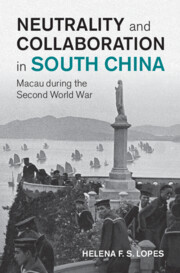Book contents
- Neutrality and Collaboration in South China
- Studies in the Social and Cultural History of Modern Warfare
- Neutrality and Collaboration in South China
- Copyright page
- Dedication
- Contents
- Figures
- Tables
- Acknowledgements
- Note on Chinese Names
- Abbreviations
- Introduction: An ‘East Asian Casablanca’
- 1 Caught in the Middle
- 2 Old Allies and New Friends
- 3 Crisis and Opportunity
- 4 The Last ‘Lone Island’
- 5 Colonial Transplantation
- 6 Seeking Justice and Recognition
- Epilogue
- Book part
- Glossary of Chinese Names
- Bibliography
- Index
6 - Seeking Justice and Recognition
Dealing with Neutrality and Collaboration after the War
Published online by Cambridge University Press: 01 June 2023
- Neutrality and Collaboration in South China
- Studies in the Social and Cultural History of Modern Warfare
- Neutrality and Collaboration in South China
- Copyright page
- Dedication
- Contents
- Figures
- Tables
- Acknowledgements
- Note on Chinese Names
- Abbreviations
- Introduction: An ‘East Asian Casablanca’
- 1 Caught in the Middle
- 2 Old Allies and New Friends
- 3 Crisis and Opportunity
- 4 The Last ‘Lone Island’
- 5 Colonial Transplantation
- 6 Seeking Justice and Recognition
- Epilogue
- Book part
- Glossary of Chinese Names
- Bibliography
- Index
Summary
This chapter demostrates that the ambiguities of wartime neutrality in Macau continued to haunt China’s relations with Portugal in the post-war years. Five interconnected issues relating to Portuguese neutrality evidence China’s post-war quest for justice and recognition: the re-establishment of regular diplomatic contacts, the handling of Japanese property, the extradition of suspects of war crimes and collaboration, the abolition of extraterritoriality and critiques of neutrality in calls to return Macau to Chinese rule. These issues raised questions about the meaning of justice and the legitimacy of who got to wield it. In its relations with a small and relatively weak European colonial power, China sought to affirm its new post-war international status. However, this process was constrained by resistance to the Nationalists’ anti-imperialist goals in South China and by the changing fortunes of Nationalist power as the Chinese Civil War unfolded.
Keywords
- Type
- Chapter
- Information
- Neutrality and Collaboration in South ChinaMacau during the Second World War, pp. 236 - 272Publisher: Cambridge University PressPrint publication year: 2023

